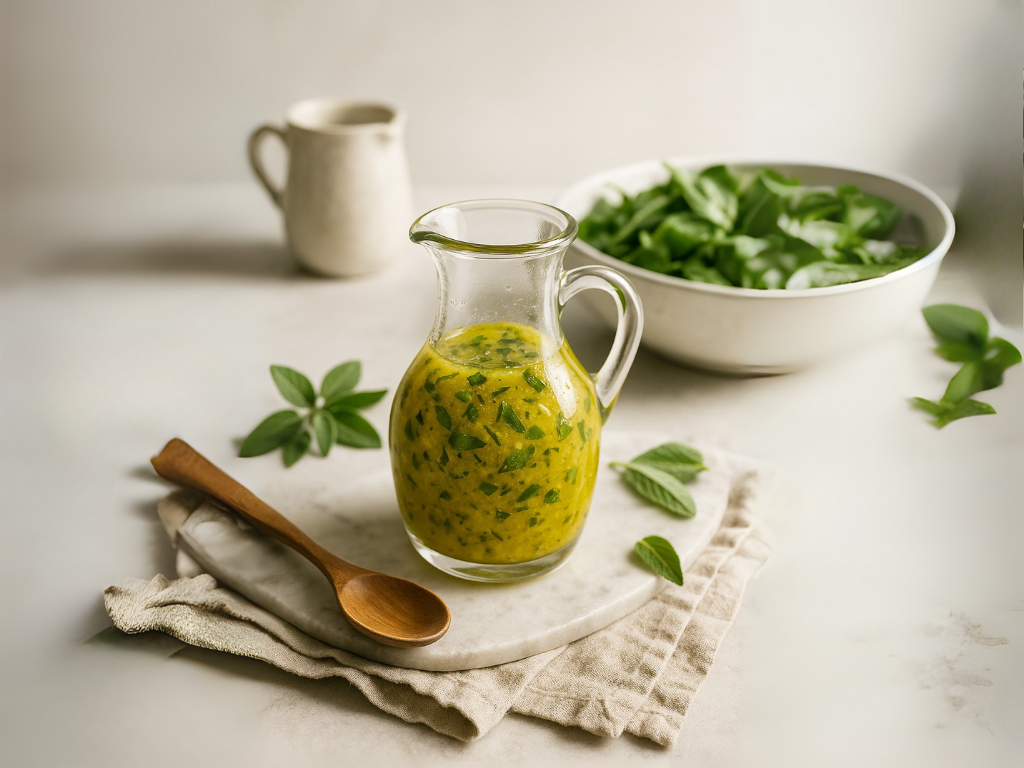Ingredients
Equipment
Method
- In a bowl, combine 2 tablespoons each of fresh lemon juice and olive oil.
- Add 1 tablespoon of chopped fresh sage to the bowl.
- Peel and mince 1 clove of garlic, then incorporate it into the dressing.
- Incorporate 1 teaspoon of Dijon mustard into the Lemon Sage Dressing.
- Season the dressing with salt and pepper to taste. Begin with a pinch of salt and a dash of pepper, adjusting according to your preference.
- Whisk the ingredients together until the dressing is well blended.
- Taste the dressing and adjust the seasoning if necessary.
- Transfer the dressing to a sealed container.
- Allow the dressing to sit at room temperature for a short while or refrigerate for later use.
- Shake or stir well before drizzling over salads for a unique and savory dressing.
Notes
Sage, known scientifically as Salvia officinalis, is a herb with a robust flavor profile.
It possesses a slightly peppery taste with hints of mint, eucalyptus, and lemon. This
earthy and aromatic quality of sage makes it an excellent complement to the zesty
lemon juice and the rich olive oil in the dressing. When using sage in this dressing,
it's best to chop it finely to fully release its essential oils and distribute its flavor
uniformly. The herb's intensity is well-balanced by the acidity of the lemon and the
smoothness of the olive oil, making it an ideal ingredient for a salad dressing that's
both flavorful and aromatic. Nutritionally, sage is a powerhouse of vitamins and minerals. It contains significant
Nutritionally, sage is a powerhouse of vitamins and minerals. It contains significant
amounts of vitamin K, which is essential for blood clotting and bone health.
Additionally, it provides smaller amounts of vitamins B6, C, and E, along with
minerals like calcium, iron, magnesium, and manganese. These nutrients contribute
to overall health and well-being in various ways, from supporting immune function
to aiding in the formation of red blood cells. In terms of health benefits, sage has a long history of medicinal use. It is known for
its antioxidant properties, due to compounds like flavonoids and phenolic acids,
which help in combating oxidative stress and reducing the risk of chronic diseases.
Sage has also been studied for its potential cognitive-enhancing effects. Some
research suggests that it may improve memory and brain function, which is
attributed to compounds like rosmarinic acid. Furthermore, sage has antimicrobial
properties, making it beneficial in fighting bacterial and fungal infections. It's also
traditionally used to help with digestive problems, reducing symptoms like bloating
and flatulence. Lastly, sage's anti-inflammatory properties can be beneficial for
those with inflammatory conditions.
It possesses a slightly peppery taste with hints of mint, eucalyptus, and lemon. This
earthy and aromatic quality of sage makes it an excellent complement to the zesty
lemon juice and the rich olive oil in the dressing. When using sage in this dressing,
it's best to chop it finely to fully release its essential oils and distribute its flavor
uniformly. The herb's intensity is well-balanced by the acidity of the lemon and the
smoothness of the olive oil, making it an ideal ingredient for a salad dressing that's
both flavorful and aromatic.
 Nutritionally, sage is a powerhouse of vitamins and minerals. It contains significant
Nutritionally, sage is a powerhouse of vitamins and minerals. It contains significant amounts of vitamin K, which is essential for blood clotting and bone health.
Additionally, it provides smaller amounts of vitamins B6, C, and E, along with
minerals like calcium, iron, magnesium, and manganese. These nutrients contribute
to overall health and well-being in various ways, from supporting immune function
to aiding in the formation of red blood cells. In terms of health benefits, sage has a long history of medicinal use. It is known for
its antioxidant properties, due to compounds like flavonoids and phenolic acids,
which help in combating oxidative stress and reducing the risk of chronic diseases.
Sage has also been studied for its potential cognitive-enhancing effects. Some
research suggests that it may improve memory and brain function, which is
attributed to compounds like rosmarinic acid. Furthermore, sage has antimicrobial
properties, making it beneficial in fighting bacterial and fungal infections. It's also
traditionally used to help with digestive problems, reducing symptoms like bloating
and flatulence. Lastly, sage's anti-inflammatory properties can be beneficial for
those with inflammatory conditions.




